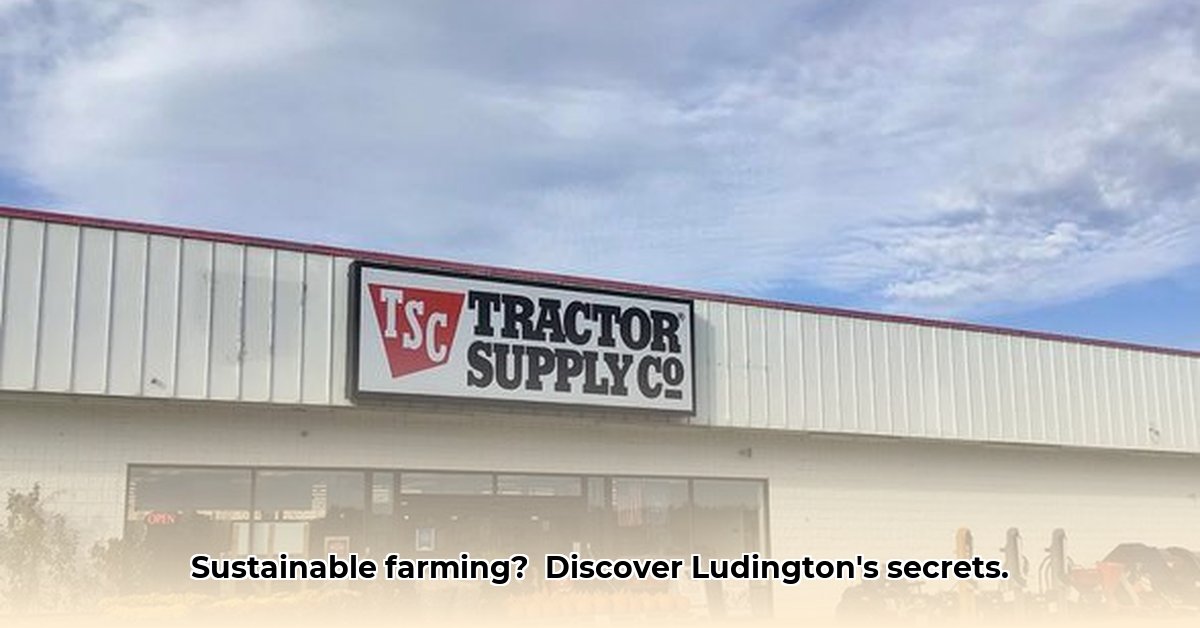
Ludington Tractor Supply (LTS) serves as a crucial resource for farmers and gardeners throughout Mason County, Michigan, including communities like Pentwater, Custer, and Scottville. Its extended hours (8 AM to 9 PM) enhance accessibility for all, suggesting a significant potential role in promoting sustainable agricultural practices. However, a comprehensive evaluation reveals both its current contributions and areas ripe for improvement. For more information on sustainable farming practices, check out this helpful resource: Cultivator Tractor Supply.
Assessing LTS's Current Impact on Sustainable Agriculture
LTS offers a vast array of products, from livestock feed and fencing to seeds and tools, catering to both large-scale farms and home gardens. This breadth of inventory is a positive starting point. However, the sustainability of these products requires further scrutiny. Currently, transparency regarding the environmental impact of their manufacturing processes and ethical sourcing is lacking. This lack of transparency hampers both customer trust and the store's ability to fully contribute to sustainable agriculture in Ludington. Without clear information on the sustainability credentials of the products they sell, it is difficult to assess their direct positive impact on the environment.
A key question remains: How environmentally responsible are the products stocked at LTS? Are manufacturers committed to sustainable practices? Are materials ethically sourced? Greater transparency in this area would significantly enhance LTS’s contribution to Ludington’s sustainability goals.
Opportunities for Enhanced Sustainability at LTS
To maximize its positive influence on sustainable agriculture within Ludington, LTS should implement several strategic improvements.
Short-Term Actions (Within One Year)
Inventory Enhancement: Conduct a thorough inventory review, prioritizing the expansion of eco-friendly options. This includes increasing the availability of organic seeds, tools crafted from sustainable materials, and fertilizers minimizing environmental impact. This would align LTS with the growing consumer demand for sustainable products. How can LTS best identify and procure these environmentally preferable options?
Staff Education and Training: Invest in comprehensive training programs to equip staff with the knowledge to effectively promote sustainable practices and guide customers toward environmentally sound purchasing decisions. Staff expertise is crucial for building confidence and trust in LTS's commitment to sustainability. What training programs would best equip employees to accurately advise customers on sustainable purchasing choices?
Enhanced Customer Feedback Mechanisms: Implement systems to gather customer feedback regarding their preferences for sustainable products and address any concerns about current offerings. Direct customer input provides invaluable data for informed decision-making concerning future product selection. What methods will best ensure accurate collection and response to customer feedback?
Long-Term Strategies (Over 3-5 Years)
Strategic Local Partnerships: Develop strong relationships with local organic farmers and suppliers. This supports the local economy while simultaneously reducing the carbon footprint associated with long-distance transportation. What local producers could become valued partners in LTS’s effort to maximize sustainable offerings?
Community Engagement and Education: Actively participate in local events and educational programs promoting sustainable agriculture. This includes hosting workshops and collaborating with community organizations to increase awareness of sustainable practices. What specific outreach and educational programs will LTS implement to actively engage with the community?
Adoption of Renewable Energy: Explore and implement the use of renewable energy sources, such as solar panels, to power the store. This action would significantly reduce the store's carbon footprint and serve as a powerful demonstration of LTS’s dedication to sustainability. What are the practical steps involved in transitioning LTS to renewable energy sources?
Challenges and Mitigation Strategies
LTS faces several challenges in its pursuit of enhanced sustainability. Addressing these requires proactive strategies.
| Risk Factor | Likelihood | Impact | Mitigation Strategy |
|---|---|---|---|
| Uncertain Product Sourcing | Moderate | High | Rigorous supplier audits, transparent product labeling, open communication with customers |
| Limited Community Engagement | Moderate | Moderate | Active outreach, community events, educational workshops, public relations campaign |
| Online Competition | High | Moderate | Competitive pricing, superior customer service, specialized, locally-sourced product selection. |
| Shifting Consumer Preferences | Moderate | High | Market research, agile adaptation to evolving demand for environmentally friendly goods. |
Key Takeaways:
- LTS possesses the potential to become a leader in promoting sustainable agriculture within Ludington.
- Enhancing product transparency, engaging the community, and adopting eco-conscious business practices are crucial for maximizing LTS's positive impact.
- Collaboration between LTS, local farmers, and the community is essential for fostering a truly sustainable agricultural ecosystem in Ludington. How can LTS best facilitate the collaboration necessary for achieving these sustainable goals?
The journey toward a greener future requires a multifaceted approach. By embracing transparency, fostering community partnerships, and continuously evaluating and improving their practices, LTS can significantly contribute to a more sustainable agricultural landscape in Ludington and beyond.